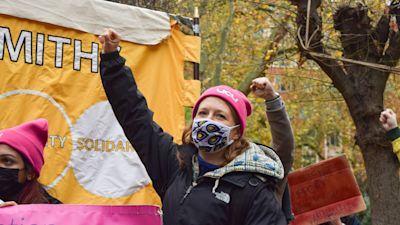Why are university lecturers set to go on strike for 10 days?

More than a million university students will face up to 10 days of strikes by lecturers in February, a union has announced.
Lecturers from 68 institutions will walk out as part of the strikes.
Here we look at why they have decided to take industrial action.
When will they take place?
Industrial action will take place over 10 days, starting with a full week of action from February 14.
A further two days of strike will be carried out on February 21 and 22, while the final three days will be from February 18 to March 2.
Why are lecturers going on strike?
Lecturers will walk out in disputes over “beyond disgraceful” pay, conditions and pensions, the University and College Union (UCU) said.
The union has called the strikes “a fight for the future of higher education”.
Staff are at “breaking point”, according to the union, due to falling pay and insecure working conditions.
It is expected that more than 50,000 staff will take part, with in excess of a million students impacted.
In the first week of strikes, 44 universities will be involved over a dispute about cuts to the Universities Superannuation Scheme (USS) pension scheme, which the union has said would reduce the guaranteed retirement income of a typical member by 35%.
Meanwhile, 68 universities will be involved in the second week of strikes over pensions, pay and working conditions, with staff walking out on two days – February 21 and 22.
In the third week of strike action, 39 universities will walk out over three days on pay and working conditions only, on February 28 to March 2.
The March 2 walkout has been co-ordinated with a student strike organised by the National Union of Students (NUS).
Could there be more strikes?
The UCU said further strikes are “on the cards”, including a UK-wide strike on pay and working conditions as well as plans for a nationwide boycott of marking and assessment.
“The NUS is calling for higher and further education to be free at the point of use for students and for staff to get better working conditions, pay and pensions,” the UCU said.
Could industrial action be avoided?
On Wednesday, the UCU announced if its proposals on pensions were heard, this offered a “way out” of imminent strike action.
It called for new pension proposals to be formally tabled and voted on and for the financial health of the USS pension scheme to be evaluated, as well as for employers to pay more towards the scheme from April 2023.
UCU general secretary Jo Grady said: “It is a damning indictment of the way our universities are managed that staff are being left with no option but to walk out again.
“For a sector that is worth tens of billions of pounds and enjoys record levels of student growth it is beyond disgraceful that in return staff get vicious pension cuts, falling pay and are pushed to breaking point under deteriorating working conditions.
“Time is quickly running out for vice chancellors to avert strike action, but it can be done.
“Staff need a proper pay rise, action to tackle insecure contracts, unsafe workloads and pay inequality, and for devastating pension cuts to be revoked.
“Any disruption that occurs will be the clearest indication yet that university bosses don’t value their staff.”
What have the universities said?
Raj Jethwa, chief executive of UCEA, which represents employers in the pay dispute, said: “It is disappointing for UCU to try to ask a minority of its members to take action again over the pay uplift from last August.
“It is important to remember that only a quarter of branches reached the legal threshold for industrial action in UCU’s most recent ballot. In terms of staff participation and teaching lost, the impact of industrial action so far has been fairly low in most higher education institutions, and even below the levels seen in the 2019 dispute.
“Rather than continuing this disruption, UCU should engage constructively in this year’s (2022-23) multi-employer negotiating round which is planned to begin at the end of March.”